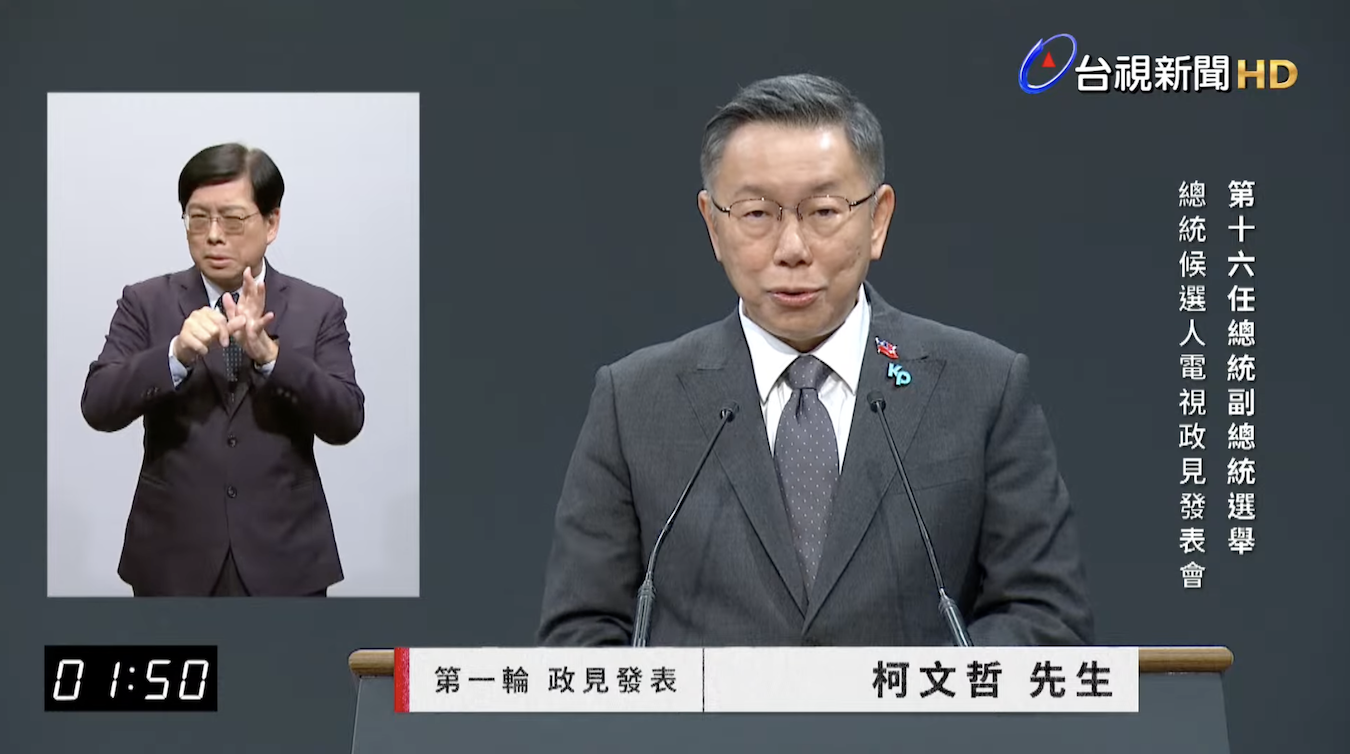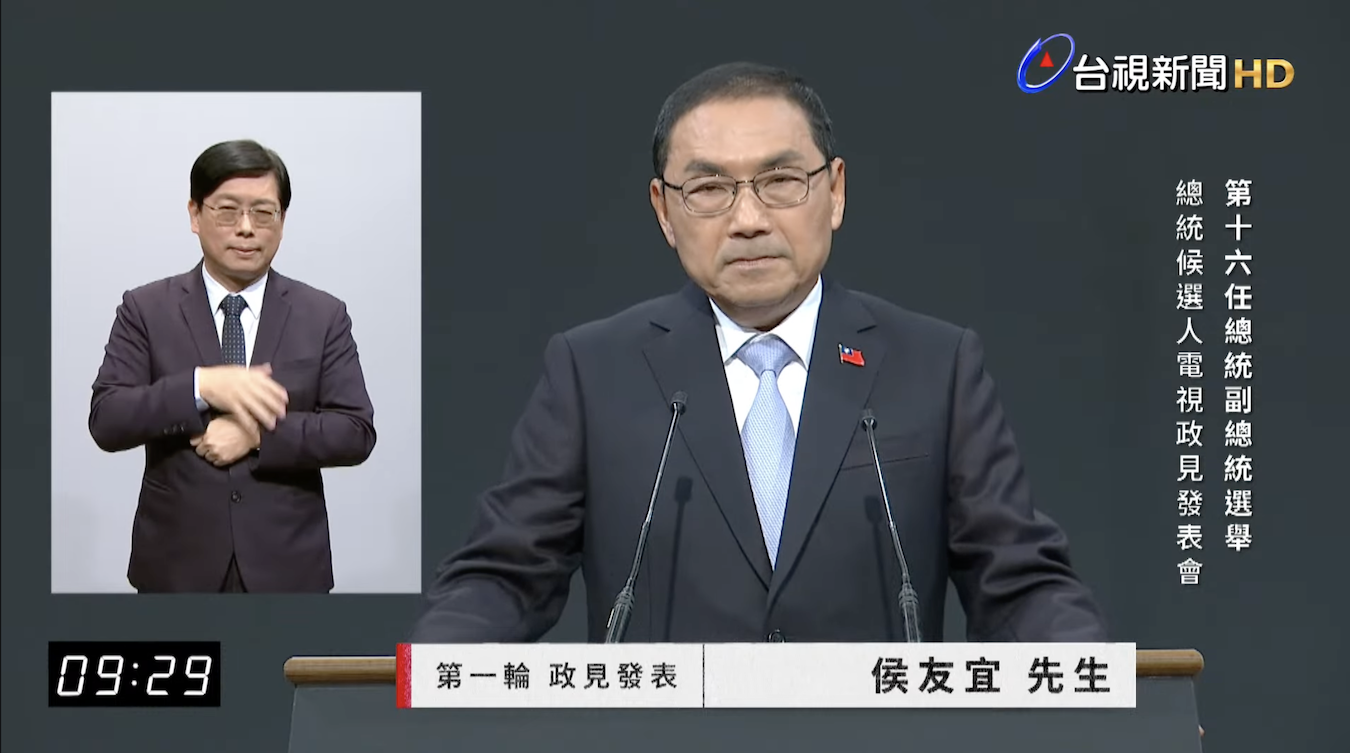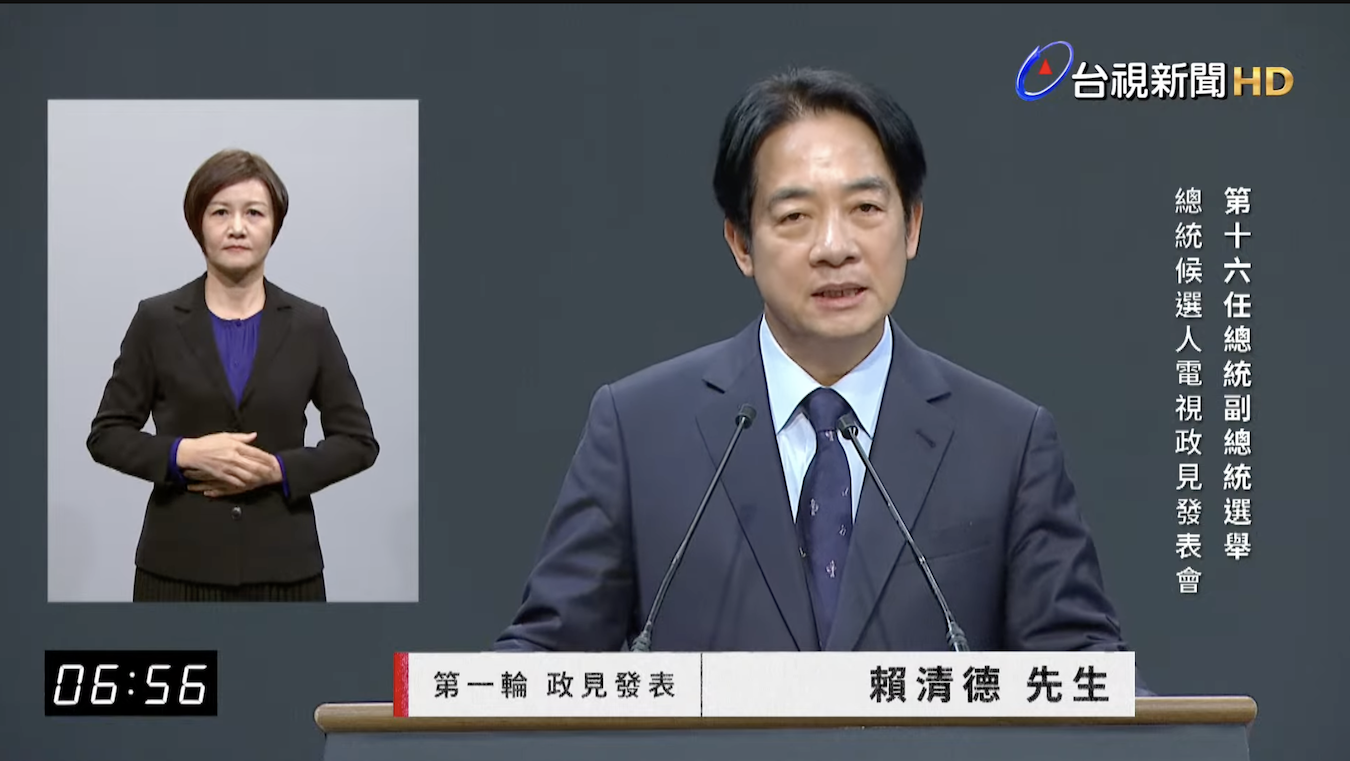by Brian Hioe
語言:
English
Photo Credit: TTV/Screenshot
THE THIRD AND final presidential policy presentation took place on Thursday. This is the last of the three presidential policy platforms that will take place before the formal debates between presidential candidates.
First to speak was Ko Wen-je of the TPP. Ko began by focusing on a recent fatal stabbing in a New Taipei school, in which a student stabbed another student to death. Ko stated that there was a need for all candidates to consider how to improve safety in schools and held a moment of silence for the deceased student. Ko then went on to discuss issues facing the medical system in Taiwan, in that medical workers are quite unhappy with the current system even if the public as a whole seems to be. Namely, medical workers make little and work long hours, and may overprescribe because of a need for fees. Ko called for more funds for the National Health Insurance system to care for medical workers and members of the public, as well as greater spending on medical care as a whole as a percentage of the GDP.
 Ko Wen-je. Photo credit: TTV/Screenshot
Ko Wen-je. Photo credit: TTV/Screenshot
Second to speak was Hou You-yi of the KMT. Hou also began with the point of the stabbing, Hou stated that the next president of Taiwan needed to confront issues of safety on campuses in Taiwan and that as president he would take on gangs and improve campus safety measures. Hou stated that Taiwan could look to Taiwan and South Korea as examples of how to improve campus safety and take steps against bullying, calling for stronger punishment against bullying, and safety inspections on campuses. Hou stated that there were too many permissions needed to search for weapons or drugs in student bags under current laws.
Last was Lai Ching-te of the DPP. Lai echoed the other candidates in expressing regret over the death. Lai called for early interventions in cases of troubled youths, while promoting mental health. Lai similarly called for improving the medical system to improve salaries and make more people willing to be medical workers. Lai specified that he would focus efforts on fighting cancer, as the leading cause of death in Taiwan, increasing spending for efforts to detect cancer, or fight it. This would serve to alleviate the burden on family members of those with cancer. Lai called for the integration of medical technologies in Taiwan to improve the medical system.
In the second round, Ko criticized the Tsai administration’s foreign policy for heightening tensions with China. Ko stated that there was a need for self-reliance and avoiding reliance on the US, so called for increasing defense spending and increasing the effectiveness of military training. Ko criticized the DPP as unable to understand China and suggested that Lai Ching-te was dangerously pro-China, but also criticized the KMT for its cross-strait policies. Ko called for cross-strait cooperation and exchanges with China to reduce the likelihood of conflict, though he also called for strengthening technological cooperation with other allies to strengthen Taiwan.
In his comments, Hou emphasized the ROC constitution and that the KMT opposes both Taiwanese independence and One Country, Two Systems. Hou agreed with the need to improve Taiwan’s medical condition, and then went on to frame the DPP as having turned Taiwan into an island with among the world’s longest working hours and low salaries for young people, stressing that the KMT’s labor policy would improve labor insurance and provide more time off for the public.
 Hou You-yi. Photo credit: TTV/Screenshot
Hou You-yi. Photo credit: TTV/Screenshot
As for Lai, stated that unlike the other candidates, he was the only candidate that had faith in Taiwan rather than China, who did not own much property, and stood most closely with young people. Lai emphasized his background from the working class and touted his record as a legislator, in promoting legislature for workers and farmers. Lai, too, stated that he would promote educational opportunities, increase salaries for workers, touting Tsai Ing-wen’s record as superior to that of Ma Ying-jeou and stating that he would continue such policies. Likewise, Lai touted policies to allow for renovations he implemented as mayor of Tainan and stated that he would roll this out to cover all of Taiwan.
In the final round, Ko accused Lai of lying when it came to stating that he accepted the “One China Principle,” claiming that his claims that “There is one family on both sides of the Taiwan Straits that share a common destiny” in previous years were different. Ko cited his record as a doctor to suggest his qualifications as a doctor while criticizing Lai, another doctor, as having led to patient deaths. To this extent, Ko touted his policies as Taipei mayor, including improving air quality, and taking care of city residents. Ko attacked both parties for unfair attacks on him, framed the Tsai administration as having led to poor cross-strait relations, and suggested that the DPP simply played off anxieties about cross-strait relations to win.
Next, Hou attacked Lai’s record as mayor of Tainan, and then returned to his background as a policeman. Hou stated that police officers have no ideological leaning and this showed his own lack of partisan leanings, but criticized political mudslinging by his opponents. Hou credited Taiwan’s accomplishment in becoming a technological power, including with regards to the semiconductor industry, as due to the KMT’s leadership, but criticized the DPP for rising socioeconomic inequality. Hou suggested that poor cross-strait relations were negatively impacting Taiwan’s ability to sign FTAs and that he would push for joining FTAs such as the CPTPP and RCEP as president.
 Lai Ching-te. Photo credit: TTV/Screenshot
Lai Ching-te. Photo credit: TTV/Screenshot
Lastly, Lai began his comments by stating that he would improve the finance industry so as to strengthen the economy and create jobs. Moreover, Lai stated that he would invest in infrastructure development, to assist small-to-medium sized enterprises, and that he would seek to promote investment. Lai then went on to criticize the pan-Blue camp for efforts to promote the CSSTA at the expense of Taiwan’s sovereignty, framing this as accepting the “One China Principle.” Lai called on voters to turn out on January 13th, given the dangers that the KMT and TPP could push Taiwan toward China using control of the legislature.
Compared to the second presidential policy presentation, the “China factor” loomed significantly larger in the final policy presentation. While Ko sought to position himself as an alternative to both the DPP and KMT, both he and Hou emphasized their attacks on Lai by framing it as a fault of the Tsai administration that cross-strait relations had deteriorated. By contrast, Lai attacked them both over the “One China Principle”, but sought to demonstrate a basis in solid domestic policy.

